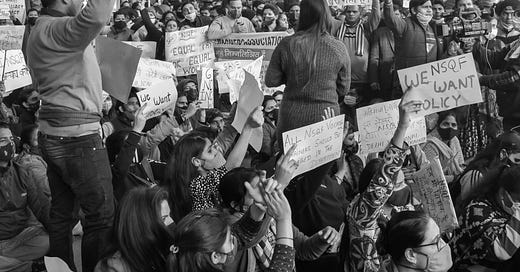The vibrant tradition of campus politics in Kerala has long been both celebrated and criticized. While campus politics is often seen as a platform for students to engage with societal issues, assert and become aware of their rights, and develop leadership skills, its violent and disruptive nature has drawn increasing concern. The roots of this politicization can be traced back to Kerala's rich political history. The state has long been a battleground for various political ideologies, and students have traditionally played a significant role in these struggles. However, the intensity and frequency of political clashes on campuses have escalated in recent years, often leading to disruptions of classes, exams, and other academic events.
Campus & Politics
For many, campus politics is essential to student development. At its core, politics is about decision-making, governance, and how power is distributed in society. It touches every aspect of our lives, from the policies that shape our education and careers to the laws that govern our daily interactions. Whether we like it or not, politics will always be a part of our lives, influencing the society we live in. Campus politics is simply an extension of this. It allows students to engage in political processes, voice their concerns, and advocate for change within a microcosm of larger society. Proponents argue that involvement in student unions and political debates helps young adults understand society, form political identities, and gain practical leadership experience. In a democratic society, these are vital skills that prepare students to become engaged, informed citizens.
Moreover, Kerala’s rich history of student activism cannot be ignored. From protests against unjust laws to advocating for student rights, Kerala’s student organizations have often been at the forefront of political change. It won't be an over-exaggeration to say that our state and many of its progressive practices were built on the shoulders of student activists. Student activism has a long history of driving social and political change, from civil rights movements to environmental campaigns. For example, the student-led civil rights sit-ins of the 1960s played a crucial role in desegregating the American South. In India, student movements have also been pivotal, such as the role of students in the Nirbhaya protests and the more recent student involvement in the protests against the Citizenship Amendment Act. Indian students have been at the forefront of advocating for social justice, equality, and human rights, mirroring global trends.
Despite these benefits, campus politics in Kerala has grown increasingly violent and disruptive, leading many to question its place in educational institutions. Over the years, student unions have become highly polarized, dominated by external political parties that often prioritize their own agendas over the interests of students. This has led to conflicts, class disruptions, and an environment where violence overshadows constructive dialogue.
Is Banning Politics the Right Move?
The call to ban campus politics stems from the idea that political activity has become immature, often leading to violence and disruption. While calling for bans are easy, there are practical difficulties to ban politics, since it is fundamental to all human interactions. When we ban politics, we cannot ensure that these activities don’t go underground beyond the confines of what is accessible to college authorities. This could worsen violence and disruptions in campus with campus authorities having no tools to control it.
Moreover, banning all political activity is an extreme measure that would infringe upon students' rights to assemble and advocate for their causes. This suppression could also prevent students from organizing to address critical issues affecting their campus life, as seen in the case of Amal Jyoti Engineering College, where a ban on student politics resulted in students being unable to voice their grievances. The tragic suicide of a student at the college brought this issue to the forefront, where student protest became the only avenue for addressing oppressive administrative practices.
A better alternative, than banning, would be to allow politics on campuses, but with regulations. In this context, the Lyngdoh Committee report, set up in 2005 by the Supreme Court to reform college elections, offers some nuanced prescriptions. Instead of banning politics, it suggests guidelines to ensure that campus politics is more structured, mature, and free from external party influence. The report emphasizes that student elections should be about student issues, not national political agendas. Following these guidelines would prevent local politicians from influencing students for personal gain while maintaining the right of students to form unions and participate in democratic processes.
The Constructive Role of Campus Politics
One of the unintended consequences of banning politics could be the resurgence of issues like ragging. In many colleges, political organizations play a role in keeping ragging under control. Political student unions often intervene in cases of ragging and ensure that students, particularly freshers, are protected from hazing rituals. Without this student oversight, ragging could see a dangerous comeback.
Moreover, student politics fosters accountability. When students are politically active, they can challenge the management on issues like unjust policies, lack of facilities, or faculty misconduct. As seen in other student movements, from the JP Movement to the protests against the CAA, student activism has the power to hold institutions and governments accountable for their actions. Banning politics would remove this check and balance system from college campuses, ultimately serving the state's interests by suppressing dissent and stifling critical voices, as seen in the aftermath of the CAA protests.
Politics, at its core, is about people coming together to fight for their rights. If student politics is reformed to focus on campus issues and student welfare, it could play a constructive role in shaping the campus environment. Take the Oxford Student Union as an example: it serves as a model of how students can organize, discuss, and push for institutional changes in a healthy, productive manner. Kerala could benefit from such a model, where politically aware students come together for a "political hackathon" to propose policies, debate solutions, and create an inclusive environment.
In cases like the Israel-Palestine conflict or the Vietnam War, university students globally have taken bold stands, which have often influenced national discourse. In India, movements like the anti-Emergency protests led by Jayaprakash Narayan have shown the power of student activism. By focusing student politics on larger societal issues rather than personal or party rivalries, Kerala’s campuses could become spaces of meaningful dialogue and change.
A Call for Constructive Student Politics
Rather than banning campus politics, Kerala should focus on reforms that make it more inclusive, responsible, and constructive. Following the Lyngdoh Committee’s recommendations, colleges should limit the involvement of political parties, promote issue-based student elections, and encourage dialogue over conflict. Student politics, if reformed, can bring about much-needed accountability, prevent ragging, and foster a politically aware student body that can contribute positively to both campus life and society at large.
In a state with such a rich tradition of political engagement, it would be a disservice to students and the larger democratic process to ban politics outright. Instead, we must seek ways to make student politics a force for good, one that empowers young people to advocate for their rights, challenge authority, and bring about meaningful change.
Note for the readers:
If you liked this article, read our other articles:











